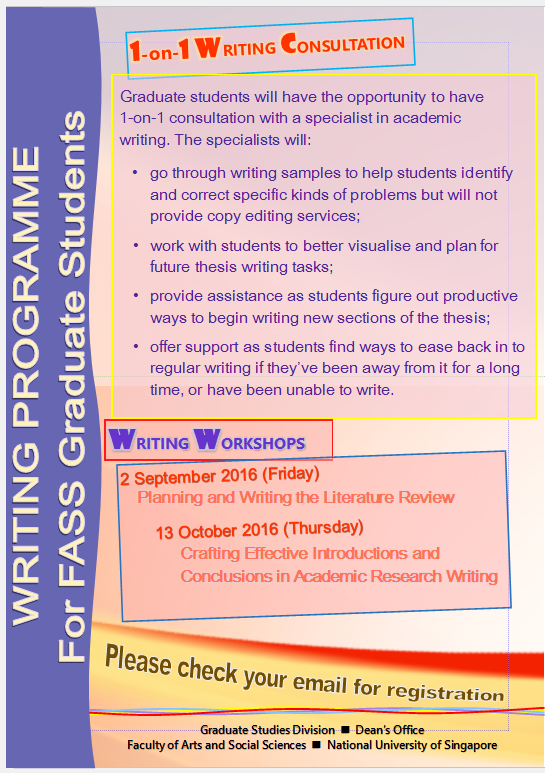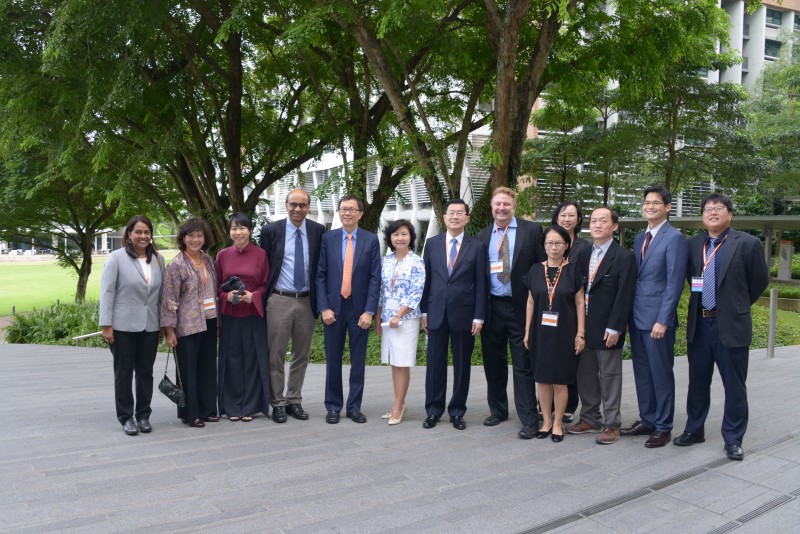
Calling out to ALL Graduate students!
Don’t miss the opportunity as the students will have a 1-on-1 writing consultation with a specialist in academic writing and Writing Workshops too!
Interested students, do check your email for registration.

Calling out to ALL Graduate students!
Don’t miss the opportunity as the students will have a 1-on-1 writing consultation with a specialist in academic writing and Writing Workshops too!
Interested students, do check your email for registration.
Wednesday, 8 June 2016
The Straits Times
This was an article contribution by Mr Chua Yeow Hwee, Instructor from the Department of Economics at NUS Faculty of Arts and Social Sciences, in which he addressed the question on whether automation increases labour productivity in Singapore. Mr Chua noted that automation can help to deepen and broaden labour skills, and develop a better quality of goods and services that might not be reflected by the standard labour productivity formula. He thus proposed the use of a Labour Productivity-Quality Index that takes into account the quality of goods and services being consumed. This could be a weighted sum of indices such as Customer’s Satisfaction. Alternatively, he suggested constructing a new indicator to show how the quality and type of goods and services have evolved.
The “Ask: NUS Economists” column is a monthly series by the NUS Economics Department. Each month, a panel will address a topical issue.
Click here to read the article.
Monday, 6 June 2016
The Korea Times
This was an article contribution by Associate Professor Shin Jang-Sup from the Department of Economics at NUS Faculty of Arts and Social Sciences. Assoc Prof Shin, who is the former adviser to South Korea’s finance minister, discussed about the major corporate restructuring that is currently taking place in Korea’s shipbuilding and shipping industries. He noted that doing business involves numerous pieces of innovation and efforts that may not be seen by outsiders and this task is more daunting in reviving troubled corporations. He opined that it is important to configure the commitment and competence of managers and workers into the overall design of the corporate restructuring process.
Click here to read the article.
Dear Students,
CFG will be hosting a Nobel Peace Laureate on campus as part of of a collaboration with PeaceJam for the launch event of PeaceJam Singapore on June 16th. (http://www.peacejam.org/events/june-16/).
Students who sign up get to meet Nobel Peace Laureate Rigoberta Menchu and attend student mentoring workshops which will help them develop leadership skills and hopefully inspire them to contribute to global peace initiatives.
The conference is free to attend and we are anticipating a large turnout with registered students from schools across Singapore as this event targets students from 13 –22 years of age.
Additionally, student leaders in FASS also have an amazing opportunity to be involved as mentors to younger students from JCs, polytechnics, and secondary schools. A call for student mentors is also attached to this email, in which interested parties will find more details about the role.
Please refer to attached documents for more information.
Attached: Student Mentors
Attached: PeaceJam 2016 Flyer (PDF)
Tuesday, 31 May 2016

The International Sociological Association (ISA) Research Committee 28 on Social Stratification & Mobility (RC28) conference on “Intergenerational Transfer, Human Capital and Inequality” was held for the first time in Southeast Asia from 26 to 28 May 2016. It was hosted by the FASS Centre for Family and Population Research (CFPR).
In his opening address, Guest-of-Honour Mr Tharman Shanmugaratnam, Singapore Deputy Prime Minister and Coordinating Minister for Economic and Social Policies, touched on the issues of social mobility and social inclusion.
Keynote speaker, Dr Noeleen Heyzer, Social Scientist and Former United Nations Under-Secretary-General, spoke on “Harnessing Human Potential for a Sustainable, Secure Future of Shared Prosperity” and pointed out that the “Asian miracle” has lifted many from poverty, yet widened the inequality gap.
Click here to read the article.
Saturday, 28 May 2016
TODAY
This was a report on a research study by Dr Vincent Chua from the Department of Sociology at NUS Faculty of Arts and Social Sciences and Dr Swee Eik Leong, an economics lecturer from the University of Melbourne, which was presented on 27 May 2016 at an international sociological conference hosted by the Centre for Family and Population Research at NUS. Their study found that females and non-Malays are likelier to enrol in elite junior colleges (JCs), particularly those located in wealthy neighbourhoods. Analysing data from more than 5,000 classrooms in six JCs over 40 years from 1971 to 2010, the researchers discovered that over time, the representation of females in elite JCs increased, while that of Malays decreased. Malays were less well-represented in elite JCs than in non-elite ones, with the gap being largest in the wealthiest neighbourhood. The findings suggest that policymakers could adopt a “cross-cutting” strategy by locating elite schools in less wealthy neighbourhoods and vice versa.
Click here to read the article.
Wednesday, 1 June 2016
Lianhe Zaobao
This was a report on an inaugural series of talks titled ‘Inspire.Psych’ which was organised by the NUS Psychology Society in March 2016. Targeted at non-psychology students, the talks aimed to help students understand how psychology can be applied to everyday life and also to provide a view of the world from a psychological perspective. The talks titled ‘How to attract the Love of your Life’ by Mr Kelvin Teng and ‘The Right of Language’ by Dr Travellia from FASS Department of Psychology focused on the topics of love and language.
Click here for the article in Mandarin.
Wednesday, 1 June 2016
The Straits Times
This was a report on a research study that was presented on 27 May 2016 at a global conference hosted by the Centre for Family and Population Research at the NUS Faculty of Arts and Social Sciences. The study was led by Ms Ong Xiang Ling, Research Officer at the Singapore Children’s Society, with Dr Cheung Hoi Shan, Postdoctoral Fellow from NUS’ Department of Psychology serving as research adviser. From September to December last year, 601 students aged between nine and 17 who came from a spread of housing estates and schools across Singapore – Integrated Programme (IP), government-aided, autonomous and government schools – and their parents were surveyed.
The study found that secondary school students in IP schools are two-and-a-half times more confident of attaining at least a university degree, compared to their peers in other schools. It also found that parents’ expectations played an important role in children’s confidence in pursuing higher education, compared to other factors such as type of school. The study which also examined class stratification in schools revealed that children from higher socio-economic backgrounds are more likely to attend IP secondary schools and their affiliated primary schools, as well as those that offer the Gifted Education Programme.
Click here to read the article.